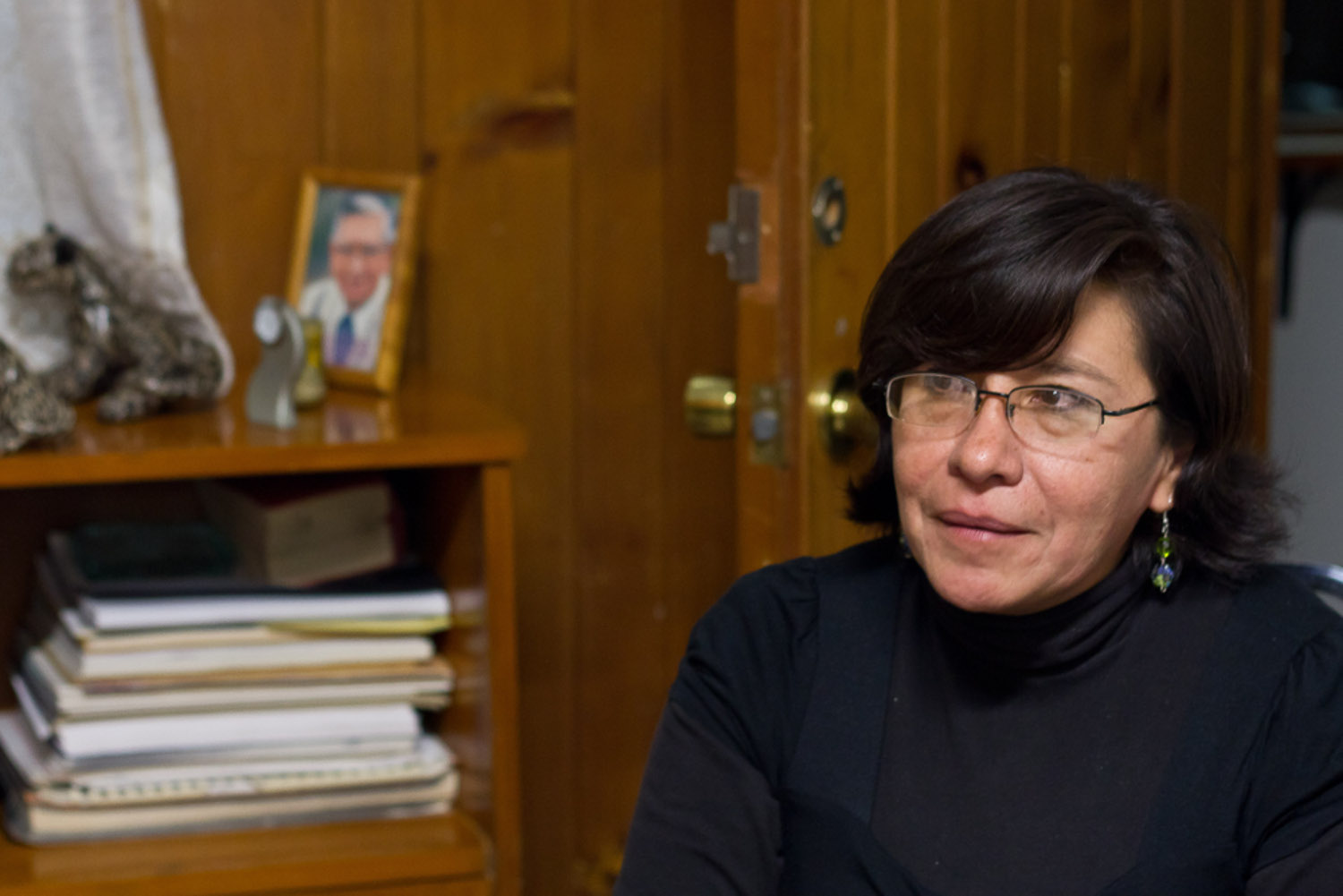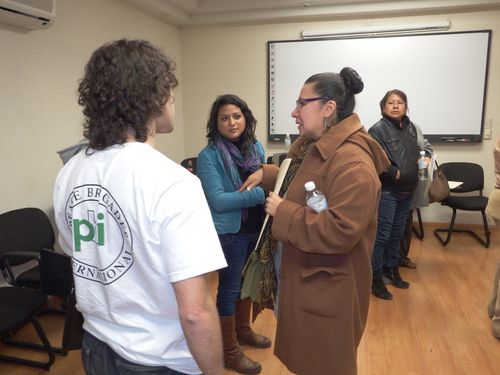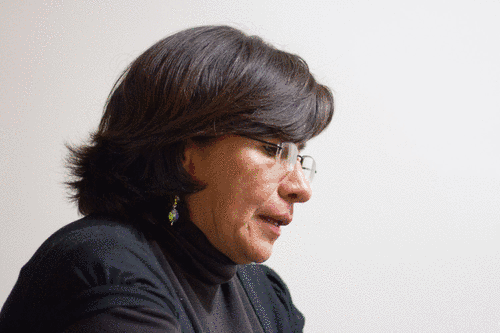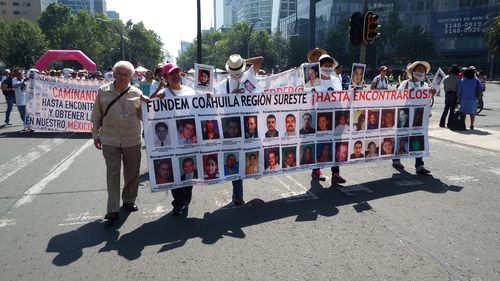Mexico City, 1 September 2015.– Between May and December 2015, PBI Mexico will publish a series of interviews with Human Rights Defenders which we accompany or with whom we maintain a close relationship. This month we present an interview with Blanca Martinez, director of the Fray Juan de Larios Diocesan Center for Human Rights of Saltillo, Coahuila. In February 2014, PBI signed an accompaniment agreement with the Center to support their human rights defense work in the state.
Photo: Blanca Martínez, director of Fray Juan de Larios Human Rights Center © Prometeo Lucero
Being a human rights defender
My name is Blanca Martinez. I am the director of the Fray Juan de Larios Diocesan Center for Human Rights which is based in Saltillo. I was born in Torreon, Coahuila, in this beautiful place which was home to many dinosaurs. Here there are many fossils. I have worked in different places throughout Mexico in organizational processes and collective rights claims. In the journey over many years I have learned to cope with the authorities, to stand and watch them from the front and to not let them intimidate me.
For me, being a human rights defender implies a life choice. It has to do with a commitment to transform the situation of injustice in our country and in the world. It is a political commitment to support an ethical approach to human rights; this should be the basic foundation of truly democratic states. Human rights work involves facing the system of oppression and injustice that we have and to walk with people whose rights are being systemically violated.
We, human right defenders do not experience more risks than the population with whom we work. When working with victims of violence we put ourselves in their position of vulnerability. This risk that we share with the people is linked to the kind of support we offer.
Fray Juan de Larios and United Forces for Our Disappeared in Coahuila (FUUNDEC)
The Center Fray Juan de Larios was formed in 2001 due to the initiative of Bishop Raul Vera Lopez. It began as a platform to educate, to help build awareness and to advise citizens about their rights. Don Raul stands out due to his commitment to the marginalized people in Mexico and in the world.
We work to fight kidnappings and violations of rights suffered by migrants, in coordination with the Saltillo Migrant Shelter. We also support our colleagues in the Migrant Shelter and in the Gerardi Human Rights Centre, who have been the subject of constant attacks here in Coahuila. We work as well in educating human rights defenders and promoters of peace building because we want to build a culture based on human rights, so that we can live free of violence.
But our work is focused on accompanying victims of violence, especially those who have suffered enforced and involuntary disappearances. We began to document this issue in 2009. The families of the disappeared began to organize, as a group, in December 2009. Since that time we have accompanied them. One very important commitment that the United Forces for Our Disappeared in Coahuila FUUNDEC has stated is to look for all the missing, those who are in our organization and those that are not. Our aims have to be for everyone, not just for "my" disappeared.
We, as a human rights center, have registered more than 300 cases but not all have been organized in FUUNDEC. Some people do not want to organize, some are very afraid, they do not want to press charges, or they just want us to know, but not act. We have cases of federal police and a state police officer who have gone missing.

Photo: Blanca Martínez, during a meeting of the Autonomous Working Group in Saltillo, Coahuila © PBI Mexico
Requests for international support
We believe there is an great risk that it becomes increasingly more difficult to get the State to accept its responsibility regarding human rights violations. Hence, it is so important to have an attentive international community, asking, pressing the state not to shut down processes and spaces of dialogue with us. The letters sent to the mothers, to family members, encourage them in their fight to keep on moving forward. All of this gives us the possibility to find, among other things, the missing persons.
Working on enforced disappearances
Enforced disappearance has historically been used by those in power as a source of social control, just like executions. You have to frighten and control the population to impose your interests. This is the case with the massive enforced disappearances we are living in Mexico, with about 27,000 cases.
In Mexico the institutions are deteriorating, and the crisis creates such conditions where we find ourselves in an undeniable state of un-governability. As power vacuums emerge, new players appear who use force, both formal or informal, to occupy the spaces of political power. In this power vacuum, organized crime comes to dispute the control of the territory, the population, the means of production and the money flow.
I had already had contact with relatives of the disappeared in the 70s, 80s, during the dirty war. The disappearances have continued in Mexico since that time. In Chiapas I worked with relatives of executed, displaced or missing persons as a result of the armed conflict.
In Saltillo I encountered a new phenomenon of enforced disappearance, one of a more complex nature, the organized crime. These disappearances imply a state responsibility, at least by ommission, by permissiveness, because the state has failed in its responsibility to ensure basic rights.
It hurts when I hear the testimonies. There are times that I feel saturated, very sad, powerless, because it is a very serious, very complex issue and beyond our capacity, but in this context my experience, my energy, has become a resource for these families.
Our work against enforced disappearance entails risk in the same proportion to the risk faced by the families, no more, no less. We know that from the moment we begin to look for them. The risk conditions for the families and for us will change, depending on what we will find as we find them, the story will tell itself.

Photo: Blanca Martínez, during interview with PBI © Prometeo Lucero
What the families are asking for
The families and us have two differentiated claims: search and investigations. Until now, the way the authorities have been investigating has not resulted in finding the missing persons. The investigation process aims to find those responsible for the crimes. In some cases, there are detainees, but nobody has confessed. It's obvious. If you are arrested and accused of a crime and they can process you, you're not going to confess anything.
But we say that justice can´t be understood without the search, rescue and location of the missing ones. The search should lead us to know where they are, who took them, why they were taken, how they were taken, what they did with them, what they are still doing with them and what we can do to rescue them. And investigation involves punishment for those responsible for these crimes.
The families of victims of disappearance need to know the truth; to know that these crimes will be punished and will not happen again.
Progress and challenges in working with Mexican authorities
With the authorities we have made some progress, and we are agreeing on basics. One of the impacts we have made is to come to an agreement, both at the federal and state level, to develop a search procedure.
Of course, for the families this is not a breakthrough. The families talk about progress and tangible results when there is some evidence or a loved one has been found, and for them, until that point nothing is progress. Part of our work together with the families is to build a political and humanitarian agenda and to demand its compliance.
We face many challenges. The state does not accept its level of responsibility by stating that these crimes were committed by non-state entities. Most authorities proceed from the assumption that the persons who are missing either left voluntarily, or had some responsibility for an illegal action or are gone as a result of paybacks. Thus the civil society is responsible for the security crisis. These attitudes reflect the state of this crisis. For the authorities it is also difficult to accept our hypothesis that it is likely that some of the missing persons were taken for forced labor. They have not wanted to follow this line of investigation. They tell us: you have to prove that there are specific actions taken by the organized crime aimed to compel persons to become forced labor, as if it was our responsibility to investigate.

Photo: Don Raúl Vera and members of FUUNDEC during the Mother's Day demonstration in Mexico City © PBI Mexico
The human factor, strengths and challenges
A valuable asset is the energy of all these women; most of those seeking their relatives are women. It is a force that allows us to breathe and grab courage and to seek possibilities of hope. Most are mothers and wives, sisters and also some brothers and fathers. And right now the children. The children! The daughters and sons are coming in the search, taking their space to understand what happened.
The families are getting strength from this search, to the extent that they join the group, go on meetings with the group and dare to speak. We start to see signs of the strengthening process in them. At the same time they all have health problems, depression and others. Their bodies react to the trauma, but the years go by and this trauma is not resolved. The solution here is to know where their missing loved ones are. When they fail to find them, they develop new diseases such as strokes, tumors. They also have fear, but even more than the fear, they have lots of anger and pain, that allows them to balance out their fear.
Socially, the families are stigmatized. There is always a question about why their missing relatives were taken away and this tends to isolate them. Most of their relatives and neighbors cut them off due to fear or suspicion. To change this we are using mobilization and visibility of this issue. This has allowed us to gradually come into contact with certain sectors of society and put our interpretation on the problem of the disappearances.
You do not disappear because you're a bad person, but because in such a state of crisis as the one we live in, anyone can be “disappeared”. And so we go on little by little gaining some awareness and solidarity.
* This interview was conducted by Susana Nistal and translated by Annie Hint
